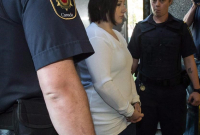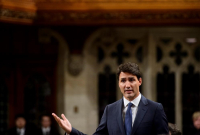Support strong Canadian climate journalism for 2025
The official charged with reviewing the controversial transfer of Tori Stafford's killer from a medium security prison to an Indigenous healing lodge says she is comfortable with the decision to move Terri-Lynne McClintic.
Anne Kelly, who was appointed commissioner of Correctional Service of Canada in July, says the agency will perform an in-depth review of the file — as requested by Public Safety Minister Ralph Goodale — but noted the service has a "rigorous case management process."
Kelly said she is looking for a member of the public to join two senior staff reviewing whether all processes were properly followed in McClintic's transfer and whether changes are needed.
"At this point I'm comfortable with the decision, however, if through the review any adjustments need to be made, I will ensure that they are implemented," Kelly told reporters Thursday.
She walked away as reporters tried to pose questions on how her personal views could affect the outcome of the case.
Her officer later clarified that Kelly believed the transfer does not pose an immediate risk to the safety and security of the public, staff or inmates.
The issue was front and centre again on Parliament Hill with Conservative calls for the Liberals to send immediately reverse the transfer. Goodale said he didn't have the authority to do that, which is why he said he asked Kelly for a detailed review of "those policies and procedures to determine whether they need to be changed."
Conservative Leader Andrew Scheer contends the government has the ability under section six of the Corrections and Conditional Release Act to issue operational directives to the Kelly as commissioner — something the Liberals dispute.
In an interview, Scheer said he believes the prime minister's decision not to intervene is tantamount to signing off on McClintic's transfer to the healing lodge.
"Justin Trudeau has the ability to put Tori's killer back behind bars," Scheer told The Canadian Press.
"He has a variety of tools at his disposal and he needs to tell Canadians whether or not he's going to do that. And if he's not, he's obviously OK with the decision."
The Liberals argue the minister can only provide high-level direction to the commissioner about general operations or policies — not about individual cases.
"The act is very clear. The control of the system lies with the commissioner," Goodale said.
Indigenous Services Minister Jane Philpott defended the use of Indigenous healing lodges as a way to provide restorative justice for Indigenous offenders — of which she says McClintic is one. She said healing lodges "have proven to provide restorative justice" and "the security that's necessary."
The question period debate about the issue was not as heated as it was on Wednesday when Conservative MPs discussed graphic details of Stafford's murder, which prompted Trudeau to demand more decorum and accuse the Tories of playing political games with the tragedy. Scheer said he found Trudeau's response "a disgusting and shameful display of a prime minister trying to avoid responsibility."
Scheer said he and his MPs felt it was necessary to remind everyone about the horrific details of the crime after Goodale referred to McClintic's role in Tori's murder as "bad practices" in a television interview earlier this week.
"When he's got a minister sitting a few seats down from him glossing over these evil actions of a deranged individuals as 'bad practices,' then yeah, we're absolutely going to put before him and his ministers what some of the details are," Scheer said.
McClintic was sentenced to life in prison after being convicted of first-degree murder of Victoria (Tori) Stafford. McClintic's boyfriend, Michael Rafferty repeatedly raped her before the eight-year-old was ultimately killed with a claw hammer to the head.
The disturbing details have been widely reported, in part, to allow the public to bear witness to the tragedy and understand McClintic's sentence, Scheer said.
"That was the purpose of recounting some of the details of the case, so that Canadians, and for Parliamentarians to know what they are defending... they have a responsibility to Canadians to explain why they think it's OK."





Comments
Minister Philpott does not seem to understand that "restorative justice" involves the victims of a crime as much it does as the offender.
Andrew Scheer's blatantly political motivations in stirring up the natural but futile revenge emotions of the public through his shock tactics in Parliament are unworthy of his own honour and do nothing to burnish the reputation of his party's honour. His word choice, conflating evil actions and deranged individuals is, to any rational person, a contradictory statement. "Evil" by most definitions is, associated with morality which is a matter of thought and choice; derangment, by contrast, is confusion, disruption, insanity - not choice but malfunction. He can't have it both ways - either the murderers were making a conscious, moral choice or they were mentally confused/disrupted/insane. Modern jurisprudence and correctional practice make distinctions about how each condition is treated. Something that the PC's apparently prefer to approach from a medieval perspective.
As far as Emmryss's comment is concerned I would not be so foolish as to pretend to understand all the subtleties of Indigenous ""restorative justice". I have read enough to believe that its objectives can be manifold - affecting the tribe (community), the victim(s) but most especially the offender - to lead the offender back into internal and external harmony. Christian notions of ``forgiveness`` and ``punishment`` are crude by contrast.
Additionally, Mr. Scheer does not seem to have any conception of how his bombast pummels the emotions and grieving of the bereaved relatives. No wonder Mr. Stafford is furious, pitched by Mr. Scheer`s inflammatory speech back into the anguish of the original crime. Given the circumstances there is little chance that Mr. Stafford can be persuaded to participate in any `restoration` - Indigenous or Christian.